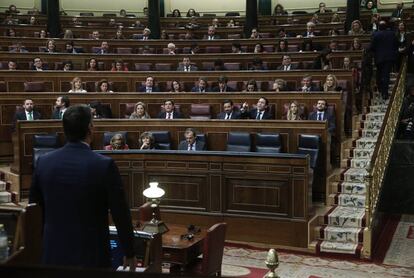Spain gets a new PM, but what can he push through parliament?
Given the arithmetic in Congress and stated intentions of opposition parties, Prime Minister Pedro Sánchez is facing a term that is likely to be beset by problems from the start


The parliamentary arithmetic and the statements of intent from Spain’s political parties in Congress point to a term in office for Prime Minister Pedro Sánchez that will be filled with problems. The Socialist Party (PSOE) politician was today voted back into office by deputies, but with a margin of just two seats.
His term in office is likely to come under all kinds of threats, right from the first days. The two-part investiture debate that took place over the weekend and concluded today has only confirmed fears of a highly charged atmosphere in Spain’s lower house of parliament going forward.
The PSOE and Unidas Podemos together have 155 lawmakers in Congress, and will require support from 21 other deputies in order to pass promised reforms on economic, judicial, social and environmental issues.
Sánchez had been trying to form a government since the general election of April 2019, and again after the repeat election in November, which gave him an indecisive victory. In the meantime, far-right Vox surged to become the third-largest force in Congress, prompting Sánchez and Unidas Podemos leader Pablo Iglesias to quickly clinch a leftist coalition deal that had previously been rejected by the PSOE leader.
The difficulties faced by Sánchez reflect the political fragmentation in Spain, where new parties emerged on the back of the economic crisis, breaking the traditional two-party rule by the PSOE and the conservative Popular Party (PP). Spaniards have voted at four general elections since 2015.
The Constitutional Court is due to replace four of its 12 current judges. The PP could block any such changes
Key to Sánchez’s success today was a deal with the Catalan Republican Left (ERC), a separatist group that agreed to abstain at the second round in exchange for opening talks between the central and Catalan governments regarding the ongoing situation in Catalonia.
Gabriel Rufián, the spokesperson for the ERC in Congress, had a warning for Sánchez during his recent speech in Congress at the investiture debate: “If there are no negotiations [on the future of Catalonia], there will be no term,” he stated.
The first meeting between the central government in Madrid and the regional government of Catalonia is due to be held in two weeks at the latest. The PSOE is hoping to convince the Catalan executive to seek an agreement to improve its self-governance, leading to a reform of the “Estatut,” the charter setting out regional powers. This reform would have to be approved by Congress and put to a vote by the citizens of the northeastern Spanish region.
Tweaking labor reforms will be more difficult, given that this will require prior negotiations with the unions and employer associations
The ERC, meanwhile, wants to secure a commitment to authorizing a legal referendum on Catalan independence from Spain. Both of these standpoints are very far apart, raising question marks about the outcome of negotiations upon which the future of the new coalition will, in part, depend.
This is not the only threat faced by the PSOE-Unidas Podemos administration. There are two key numbers in Sánchez’s immediate future: 176 and 210. He will need an absolute majority in Congress – 176 deputies – to approve organic laws (defined in the Constitution as “those related to the development of fundamental rights and public liberties, those that approve Statutes of Autonomy and the general electoral regime, and others foreseen in the Constitution”), and three-fifths of Congress – 210 deputies – to make changes to institutional bodies such as Spain’s legal watchdog, the CGPJ, the Supreme Court, the Constitutional Court and the Ombudsman.
Sánchez’s government is facing a situation similar to that suffered by former PSOE Prime Minister José Luis Rodríguez Zapatero when he tried to shake up the CGPJ. Between November 2006 and September 2008, the judicial oversight body was governed by an acting conservative majority, while the right-of-center Popular Party (PP) blocked all attempts at overhauling the institution for two years.
In the next few weeks, the CGPJ will decide on who will occupy the current vacancies in the Supreme Court, a key institution when it comes to trying cases involving politicians. The tribunal will, for example, have to deal with appeals by the PP in the so-called Gürtel corruption case, a kickbacks-for-contracts scandal that has plagued the party for years, as well as the appeal filed by Catalan regional premier Quim Torra against his disqualification from office for refusing to remove banners in favor of jailed pro-Catalan independence leaders from public buildings during an election campaign.
Sánchez had been trying to form a government since the general election of April 2019
The Constitutional Court is also due to replace four of its 12 current judges. The PP could potentially block any such changes, or reach agreement on candidates with the PSOE. The latter option would see the court retain the conservative majority currently in place.
The government will need a simple majority in order to get its budget plans approved for 2020. The April 2019 election was called when the budget that had been agreed with Unidas Podemos was rejected by the deputies in Congress. If Sánchez manages to get the 2020 plan through the lower house, he should be guaranteed at least a few years in power.
Repealing or reforming other laws – such as the controversial so-called “Gag Law,” which introduced major restrictions on citizens’ rights to protest – should be relatively simple for Sánchez, despite the need for an absolute majority.
Reforming or repealing the PP’s labor reforms will be more difficult, given that this will require prior negotiations with the unions and employer associations. Business leaders have already voiced their rejection of the future policies announced by Sánchez. In Congress, a simple majority would be sufficient to pass what could end up being one of the star policies of the prime minister’s term.
Sánchez originally came to power thanks to a motion of no confidence he tabled against then-PP Prime Minister Mariano Rajoy. One advantage that Sánchez will have in this upcoming term is that it is almost impossible that current PP leader Pablo Casado could scrape together the 176 votes to oust him from power in a similar way.
English version by Simon Hunter.
Tu suscripción se está usando en otro dispositivo
¿Quieres añadir otro usuario a tu suscripción?
Si continúas leyendo en este dispositivo, no se podrá leer en el otro.
FlechaTu suscripción se está usando en otro dispositivo y solo puedes acceder a EL PAÍS desde un dispositivo a la vez.
Si quieres compartir tu cuenta, cambia tu suscripción a la modalidad Premium, así podrás añadir otro usuario. Cada uno accederá con su propia cuenta de email, lo que os permitirá personalizar vuestra experiencia en EL PAÍS.
¿Tienes una suscripción de empresa? Accede aquí para contratar más cuentas.
En el caso de no saber quién está usando tu cuenta, te recomendamos cambiar tu contraseña aquí.
Si decides continuar compartiendo tu cuenta, este mensaje se mostrará en tu dispositivo y en el de la otra persona que está usando tu cuenta de forma indefinida, afectando a tu experiencia de lectura. Puedes consultar aquí los términos y condiciones de la suscripción digital.








































